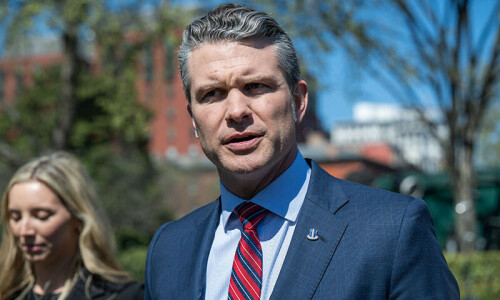TUESDAY’S suicide blast in Peshawar that claimed some 20 lives has brought Pakistan face to face with a reality that many of us have been too timid to confront: the run-up to polls in this country can be a dangerous phase for politics and can slow down campaigning. The dead included the ANP’s Haroon Bilour, whose father was killed in a similar attack in 2012.
That the horrifying attack took place as Mr Bilour was canvassing is proof that we are not yet rid of the militant elements that had held us hostage for a number of years.
The incident exposes the lack of adequate safety measures for politicians in general — especially after state security was curtailed for them, among others, some weeks ago.
The administration and everyone else who is responsible for holding peaceful elections are duty-bound to ensure that the right measures are in place for the smooth conduct of this sensitive exercise.
Theories which assert that security for electioneering and poll candidates are an undue luxury must be shunned in these days, in favour of a more pragmatic, and humane, approach.
Pakistanis know well how quickly an election can degenerate into a situation where violence is perpetuated to tip the scales to the advantage of the favourites.
The 2013 poll was one of the most violent in the country’s history. Data from the Pakistan Institute of Peace Studies listed some 148 terrorist attacks across Pakistan between Jan 1 and May 15, 2013.
As in the case of the latest blast in Peshawar, the militants publicly owned these attacks. Along with the ANP, the PPP and MQM were threatened and frequently attacked by the militants, which damaged their electoral campaigns.
Clearly, these parties, which represent a large section of the Pakistani electorate, did not enjoy the kind of protection that the state should have provided to them in 2013. They were left to find their own defence to fight the vicious onslaught.
That they were unable to do so and secure themselves during the poll season showed adversely in the election results. It wasn’t just their loss; the cost was paid by the people of Pakistan as well. The 2013 election was reduced to an uneven contest that did not fulfil the requirements of democracy.
The recent attack in Peshawar, a city fit to showcase Pakistani pluralism given the many shades of politics that it boasts, is a grim warning that the ghosts of 2013 may revisit us again in large numbers — unless the country is ready and vigilant enough to stop their advance which has clearly begun.
Published in Dawn, July 12th, 2018
















































